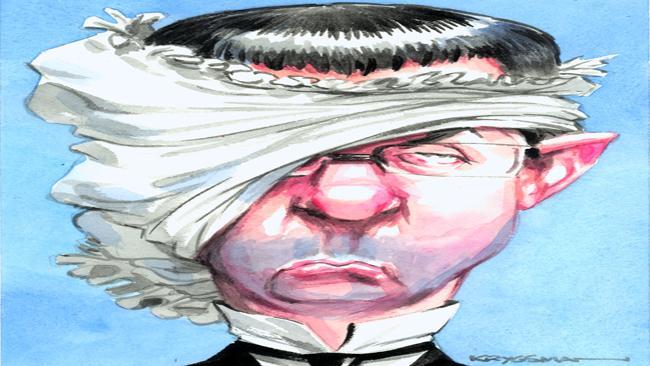
EVERYBODY knows it's the last thing you say when you're trying to scam your way into the Manuka Oval, and to be fair to Julia Gillard's partner, it probably was.
It appears that Tim Mathieson tried every other trick to get past the guard at the VIP entrance before reaching to the bottom of the rhetorical bucket and asking: "Do you know who I am?"
It is a line that would work like a charm for Russian first lady Lyudmila Putin in the unlikely event she got knocked back at the Bolshoi, but in Australia the utterance of six intemperate words, otherwise known as an Iguana moment, are enough to ruin the most promising career. Should Belinda Neal, the culprit in the Iguana restaurant incident, ever try it on again, the waiter will have the perfect riposte: "Yes, you're a former MP."
Mathieson is not shy at playing the "don't you know who I am" card, according to Kate Legge's illuminating profile in The Weekend Australian Magazine earlier this month. It is puzzling that he would risk reputational damage just to watch the Greater Western Sydney Giants beat the Gold Coast Suns. He should know the rules by now: a bloke who turns up with a ticket gets in to watch the match; a first bloke with tickets on himself gets into the newspapers.
Since 1788, and arguably before, getting uppity has been Australia's most serious social crime. Australians tolerate boofheads, nongs and drongos, since they accept that stupidity is not always a matter of choice. Condescension is another matter altogether; there is no place for deference, rank and title in the Australian book of etiquette. The offence of big-noting, sometimes colourfully and improbably described as "being up yourself", is utterly un-Australian. We accept that wealth, or in Mathieson's case, privilege, may be unequally distributed. No one expects to see the Prime Minister's paramour barracking from the hill. It is an offence, however, to demand an unreasonable quota of esteem.
In a document ranking prime ministerial problems, Mathieson's behaviour at the football probably wouldn't make the first 20 pages. Neither would his aristocratic wave from the steps of the plane. Yet the second act, rather than the first, is the one that most troubles the egalitarian soul.
It seems to fit a pattern of behaviour within the broader political class, where they carry on like a bunyip aristocracy, the "Botany Bay magnificos" ridiculed by Daniel Deniehy in 1853. They can be comical, to be sure, but as Deniehy presciently added, "these pygmies might do a great deal of mischief".
Take Communications Minister Stephen Conroy's throwaway line at an industry conference in New York last September: "If I say to everyone in this room, 'If you want to bid next week in our spectrum auction, you'd better wear red underpants on your head', I've got some news for you. You'll be wearing them on your head. I have unfettered legal power."
Actually no, senator, that is not the way things work in Australia, no matter how slyly you might have drafted the legislation. You might imagine that you are starring in West Wing, but actually you're in Downton Abbey; Australian bureaucrats are public servants and to the extent to which the minister has any powers at all, they are those of the housekeeper.
That was the way the novelist DH Lawrence saw things when he visited Australia in 1922 and most fair-minded people, even today, would judge that he got it pretty right: "The proletariat appoints men to administer the law, not to rule. These ministers are not really responsible, any more than a housemaid is responsible. The proletariat is all the time responsible, the only source of authority. The ministers are merest instruments."
Leaving aside for the moment the minister's intention to roll back 200 years of press independence, there is something deeply offensive in the appointment of an advocate to look after the public interest.
What does Conroy think we were doing in August, 2010, when 93 per cent of Australians turned out to elect 150 advocates in the House of Representatives and a bunch more in the Senate?
The more isolated the political class becomes, the more out of touch it is with the views of normal people, the more they are encouraged to circumvent democracy.
They appoint commissioners and investigative boards, people such as the former head of the Human Rights Commission, Cathy Branson, who told a gathering last year some things were "much too important to leave just to governments".
If Branson meant matters of personal responsibility, such as caring for family and standing by friends in need, we could agree with her, but she did not.
The task Branson thought too consequential to be decided by an elected body was the creation of a "strong national culture of human rights", a job for which the members of the commissioner class believe themselves to be uniquely qualified.
And so, with a haughty wave from the top of the steps, we are off on another flight of fancy, another extra-democratic adventure aided and abetted by a political class anxious to avoid the mistake of 1999, when they allowed John Howard to put their beloved republic to a referendum. One vote, one value is all very well in theory, but as George Orwell observed in The Road to Wigan Pier: "I have yet to meet a working miner, steelworker, cotton-weaver, docker, navvy or whatnot who was 'ideologically' sound."
Nick Cater's book The Lucky Culture will be published in May.



